Unit 2 How often do you exercise 词汇语法讲练 2021-2022学年人教版英语八年级上册
文档属性
| 名称 | Unit 2 How often do you exercise 词汇语法讲练 2021-2022学年人教版英语八年级上册 |
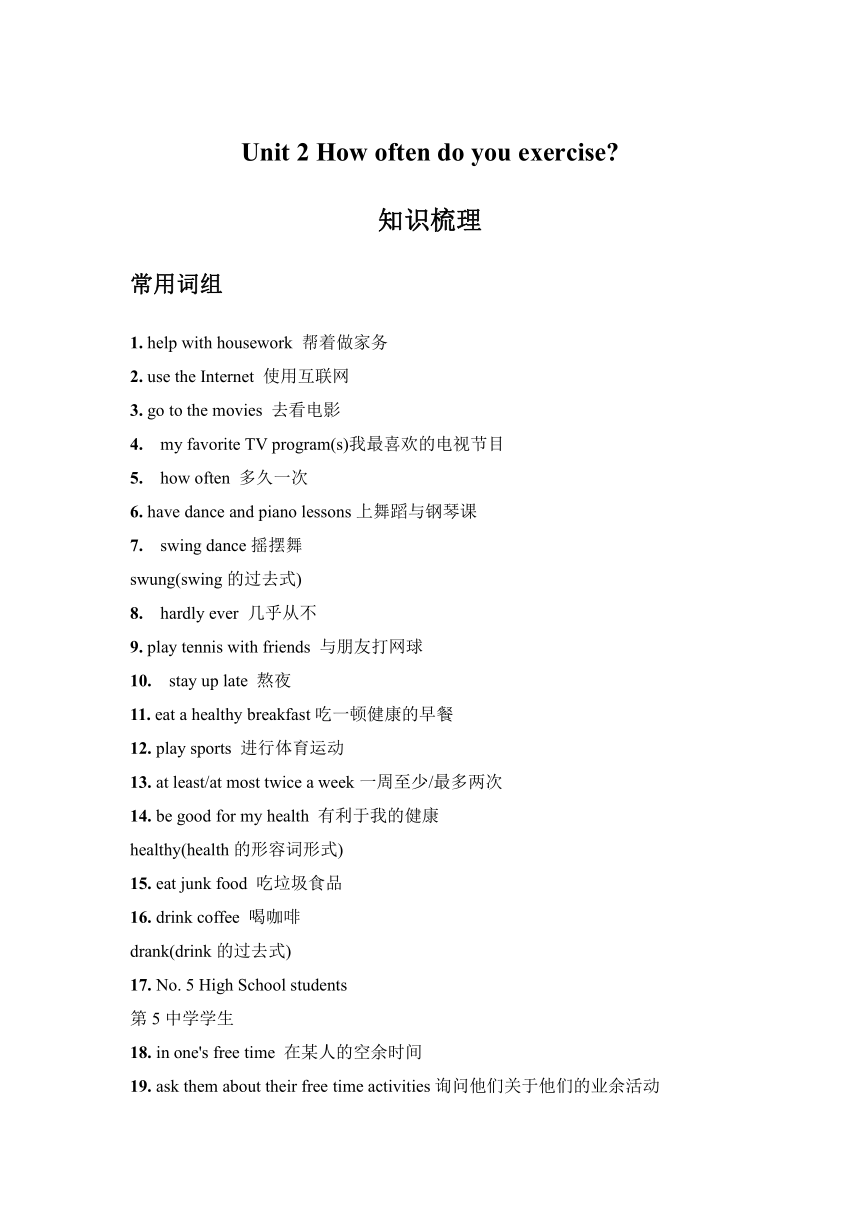
|
|
| 格式 | docx | ||
| 文件大小 | 26.2KB | ||
| 资源类型 | 教案 | ||
| 版本资源 | 人教新目标(Go for it)版 | ||
| 科目 | 英语 | ||
| 更新时间 | 2021-08-07 00:00:00 | ||
图片预览

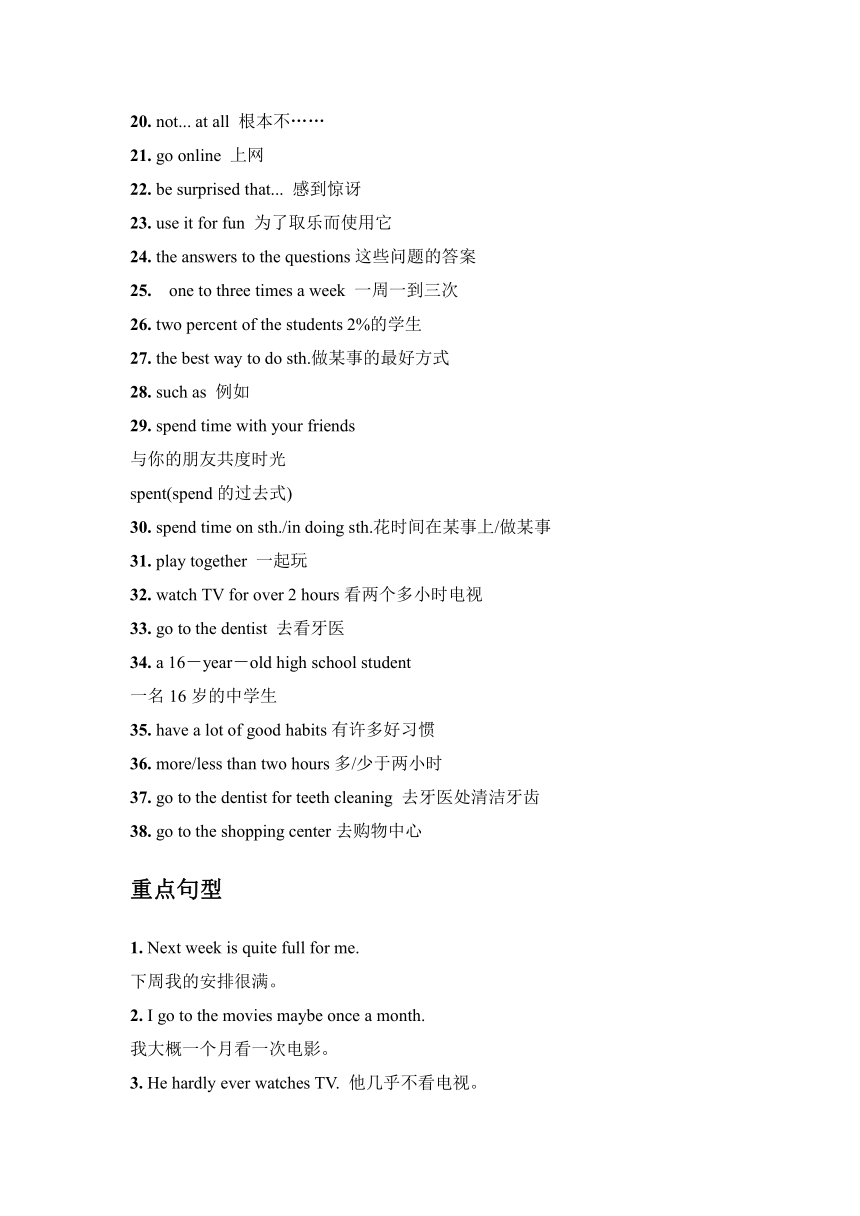
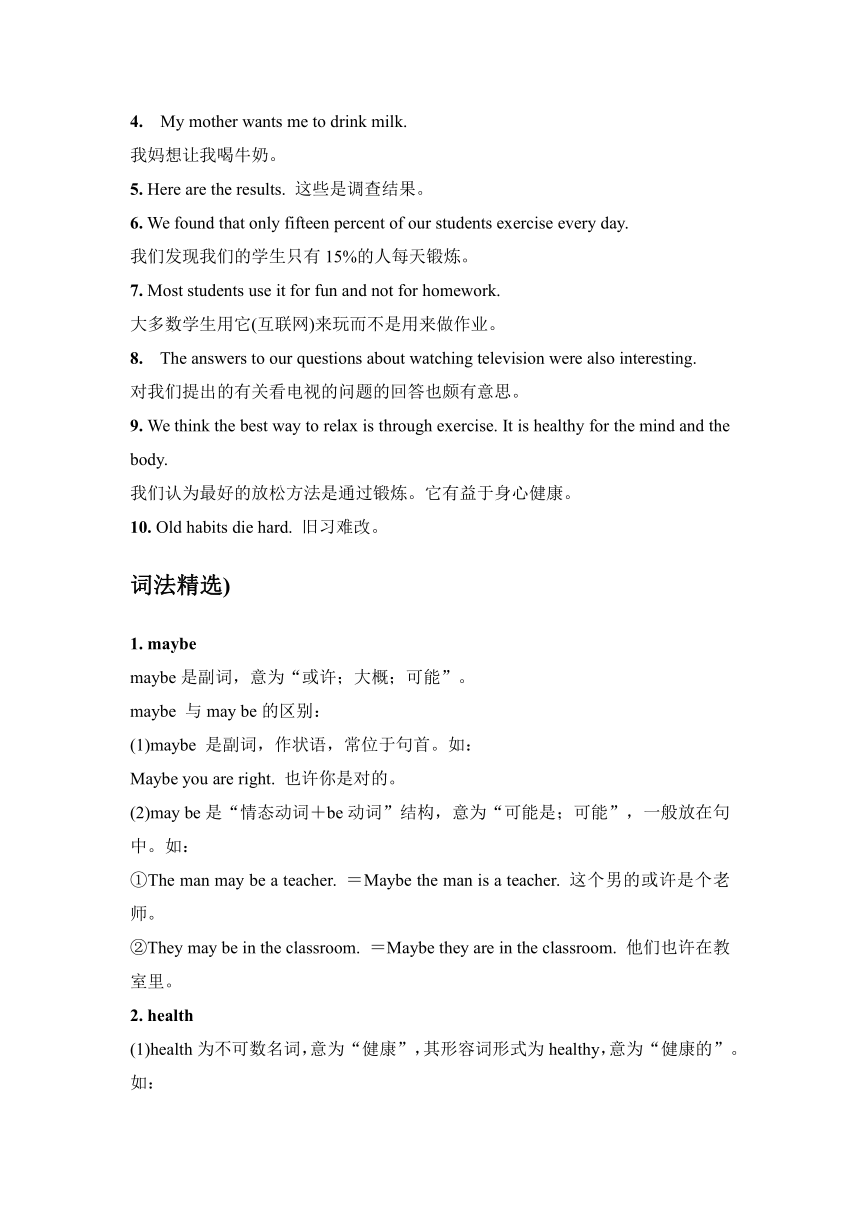
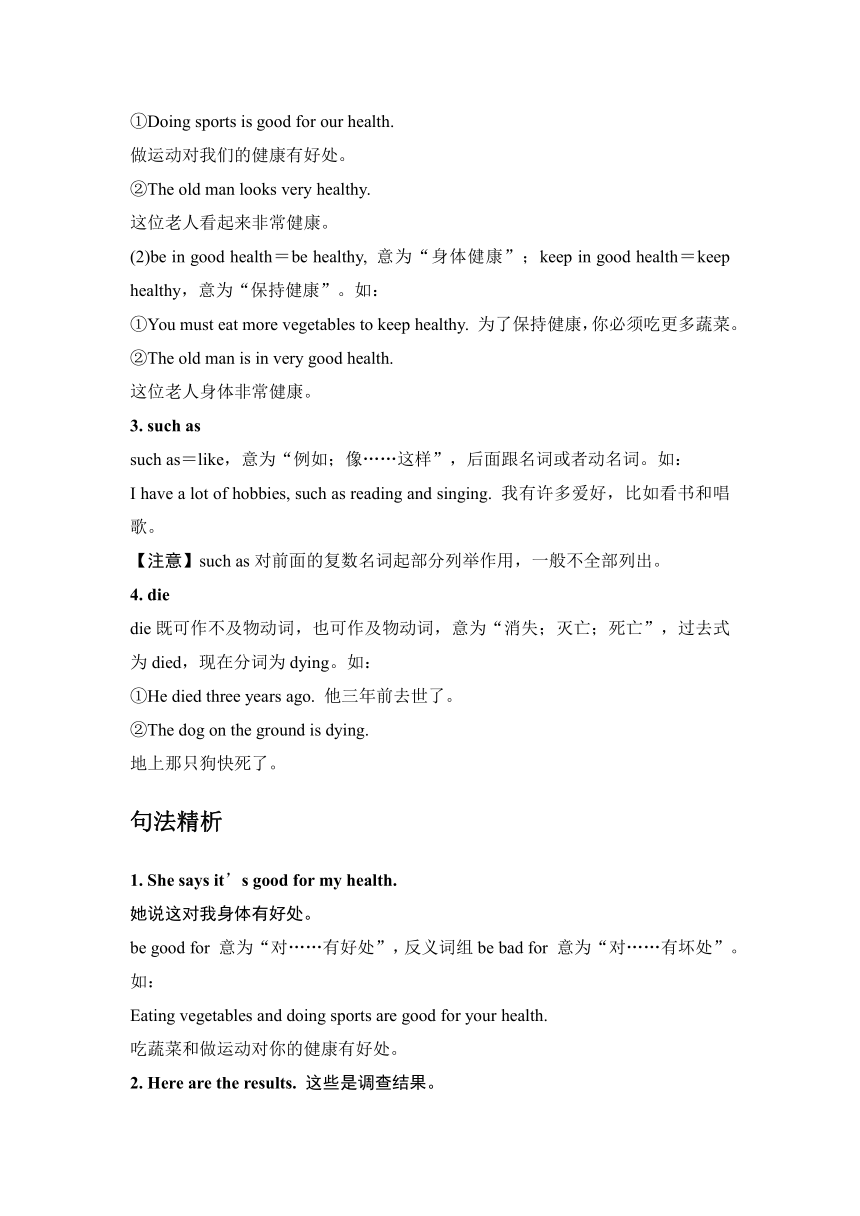
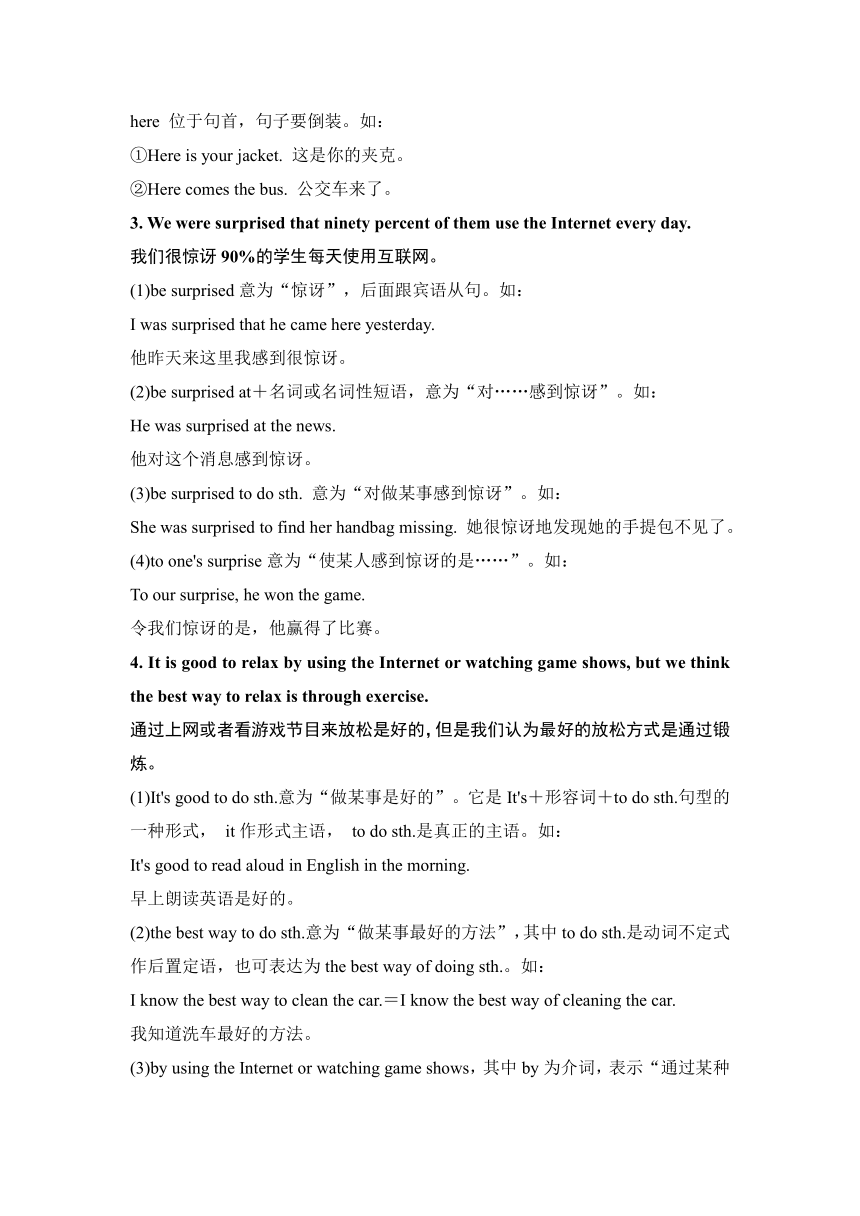
文档简介
Unit
2
How
often
do
you
exercise?
知识梳理
常用词组
1.
help
with
housework
帮着做家务
2.
use
the
Internet
使用互联网
3.
go
to
the
movies
去看电影
4.
my
favorite
TV
program(s)我最喜欢的电视节目
5.
how
often
多久一次
6.
have
dance
and
piano
lessons上舞蹈与钢琴课
7.
swing
dance摇摆舞
swung(swing的过去式)
8.
hardly
ever
几乎从不
9.
play
tennis
with
friends
与朋友打网球
10.
stay
up
late
熬夜
11.
eat
a
healthy
breakfast吃一顿健康的早餐
12.
play
sports
进行体育运动
13.
at
least/at
most
twice
a
week一周至少/最多两次
14.
be
good
for
my
health
有利于我的健康
healthy(health的形容词形式)
15.
eat
junk
food
吃垃圾食品
16.
drink
coffee
喝咖啡
drank(drink的过去式)
17.
No.
5
High
School
students
第5中学学生
18.
in
one's
free
time
在某人的空余时间
19.
ask
them
about
their
free
time
activities询问他们关于他们的业余活动
20.
not...
at
all
根本不……
21.
go
online
上网
22.
be
surprised
that...
感到惊讶
23.
use
it
for
fun
为了取乐而使用它
24.
the
answers
to
the
questions这些问题的答案
25.
one
to
three
times
a
week
一周一到三次
26.
two
percent
of
the
students
2%的学生
27.
the
best
way
to
do
sth.做某事的最好方式
28.
such
as
例如
29.
spend
time
with
your
friends
与你的朋友共度时光
spent(spend的过去式)
30.
spend
time
on
sth./in
doing
sth.花时间在某事上/做某事
31.
play
together
一起玩
32.
watch
TV
for
over
2
hours看两个多小时电视
33.
go
to
the
dentist
去看牙医
34.
a
16-year-old
high
school
student
一名16岁的中学生
35.
have
a
lot
of
good
habits有许多好习惯
36.
more/less
than
two
hours多/少于两小时
37.
go
to
the
dentist
for
teeth
cleaning
去牙医处清洁牙齿
38.
go
to
the
shopping
center去购物中心
重点句型
1.
Next
week
is
quite
full
for
me.
下周我的安排很满。
2.
I
go
to
the
movies
maybe
once
a
month.
我大概一个月看一次电影。
3.
He
hardly
ever
watches
TV.
他几乎不看电视。
4.
My
mother
wants
me
to
drink
milk.
我妈想让我喝牛奶。
5.
Here
are
the
results.
这些是调查结果。
6.
We
found
that
only
fifteen
percent
of
our
students
exercise
every
day.
我们发现我们的学生只有15%的人每天锻炼。
7.
Most
students
use
it
for
fun
and
not
for
homework.
大多数学生用它(互联网)来玩而不是用来做作业。
8.
The
answers
to
our
questions
about
watching
television
were
also
interesting.
对我们提出的有关看电视的问题的回答也颇有意思。
9.
We
think
the
best
way
to
relax
is
through
exercise.
It
is
healthy
for
the
mind
and
the
body.
我们认为最好的放松方法是通过锻炼。它有益于身心健康。
10.
Old
habits
die
hard.
旧习难改。
词法精选)
1.
maybe
maybe是副词,意为“或许;大概;可能”。
maybe
与may
be的区别:
(1)maybe
是副词,作状语,常位于句首。如:
Maybe
you
are
right.
也许你是对的。
(2)may
be是“情态动词+be动词”结构,意为“可能是;可能”,一般放在句中。如:
①The
man
may
be
a
teacher.
=Maybe
the
man
is
a
teacher.
这个男的或许是个老师。
②They
may
be
in
the
classroom.
=Maybe
they
are
in
the
classroom.
他们也许在教室里。
2.
health
(1)health为不可数名词,意为“健康”,其形容词形式为healthy,意为“健康的”。如:
①Doing
sports
is
good
for
our
health.
做运动对我们的健康有好处。
②The
old
man
looks
very
healthy.
这位老人看起来非常健康。
(2)be
in
good
health=be
healthy,
意为“身体健康”;keep
in
good
health=keep
healthy,意为“保持健康”。如:
①You
must
eat
more
vegetables
to
keep
healthy.
为了保持健康,你必须吃更多蔬菜。
②The
old
man
is
in
very
good
health.
这位老人身体非常健康。
3.
such
as
such
as=like,意为“例如;像……这样”,后面跟名词或者动名词。如:
I
have
a
lot
of
hobbies,
such
as
reading
and
singing.
我有许多爱好,比如看书和唱歌。
【注意】such
as对前面的复数名词起部分列举作用,一般不全部列出。
4.
die
die既可作不及物动词,也可作及物动词,意为“消失;灭亡;死亡”,过去式为died,现在分词为dying。如:
①He
died
three
years
ago.
他三年前去世了。
②The
dog
on
the
ground
is
dying.
地上那只狗快死了。
句法精析
1.
She
says
it’s
good
for
my
health.
她说这对我身体有好处。
be
good
for
意为“对……有好处”,反义词组be
bad
for
意为“对……有坏处”。如:
Eating
vegetables
and
doing
sports
are
good
for
your
health.
吃蔬菜和做运动对你的健康有好处。
2.
Here
are
the
results.
这些是调查结果。
here
位于句首,句子要倒装。如:
①Here
is
your
jacket.
这是你的夹克。
②Here
comes
the
bus.
公交车来了。
3.
We
were
surprised
that
ninety
percent
of
them
use
the
Internet
every
day.
我们很惊讶90%的学生每天使用互联网。
(1)be
surprised意为“惊讶”,后面跟宾语从句。如:
I
was
surprised
that
he
came
here
yesterday.
他昨天来这里我感到很惊讶。
(2)be
surprised
at+名词或名词性短语,意为“对……感到惊讶”。如:
He
was
surprised
at
the
news.
他对这个消息感到惊讶。
(3)be
surprised
to
do
sth.
意为“对做某事感到惊讶”。如:
She
was
surprised
to
find
her
handbag
missing.
她很惊讶地发现她的手提包不见了。
(4)to
one's
surprise意为“使某人感到惊讶的是……”。如:
To
our
surprise,
he
won
the
game.
令我们惊讶的是,他赢得了比赛。
4.
It
is
good
to
relax
by
using
the
Internet
or
watching
game
shows,
but
we
think
the
best
way
to
relax
is
through
exercise.
通过上网或者看游戏节目来放松是好的,但是我们认为最好的放松方式是通过锻炼。
(1)It's
good
to
do
sth.意为“做某事是好的”。它是It's+形容词+to
do
sth.句型的一种形式,
it作形式主语,
to
do
sth.是真正的主语。如:
It's
good
to
read
aloud
in
English
in
the
morning.
早上朗读英语是好的。
(2)the
best
way
to
do
sth.意为“做某事最好的方法”,其中to
do
sth.是动词不定式作后置定语,也可表达为the
best
way
of
doing
sth.。如:
I
know
the
best
way
to
clean
the
car.=I
know
the
best
way
of
cleaning
the
car.
我知道洗车最好的方法。
(3)by
using
the
Internet
or
watching
game
shows,其中by为介词,表示“通过某种方式”,置于动名词前表示方法、手段、原因等。如:
I
study
English
by
listening
to
English
songs.
我通过听英文歌曲学习英语。
语法精讲
频度副词
(1)在句子中,频度副词常放在实义动词前面,
be动词、情态动词和助动词后面。如:
He
always
helps
others.
他总是帮助别人。
(2)常用频度副词:always(总是)→usually(通常)→often(经常)→sometimes(有时)→hardly
ever(几乎不)→never(从不)
常见词组:once
a
week
一周一次;twice
a
month
每月两次;one
to
three
times
a
year
一年一到三次;
two
or
three
times
a
day
一天两次或三次;
every
day
每天;
every
three
minutes
每三分钟
(3)对频度副词提问用how
often,意为“多久一次”。如:
①—How
often
do
you
play
sports?
你多久运动一次?
—Three
times
a
week.
一周三次。
②—How
often
does
he
watch
TV?
他多长时间看一次电视?
—He
watches
TV
every
day.
他每天看电视。
巩固提升
词形变换
1.
________(adv.
一次;曾经)→________(num.一;一个)→________(num.
第一)
2.
________(adv.
两次;两倍)→________(num.两个)→________(num.
第二)
3.
________(v.
使摆动;过去式:________)
4.
________(n.
健康)→________(adj.
健康的)
5.
________(n.
身体)→________(复数形式)
6.
________
(v.
消失;灭亡;死亡)→________(adj.
垂死的)
7.
________(v.
写;过去式:________)→________(n.
作家)
8.
________(v.
使……惊讶;n.
惊喜;惊讶)→__surprised__(adj.
感到惊讶的[指人])
试题精编
一、根据句意及汉语提示完成句子
1.
What
TV
________(节目)
do
you
usually
watch?
2.
Do
you
often
do
________(家务)
on
weekends?
3.
—Shall
we
visit
the
farm
this
weekend?
—I'm
afraid
I
can't.
This
weekend
is
too
________(忙的)
for
me.
4.
What
would
you
like
to
drink,
________(咖啡)
or
tea?
5.
It's
a
good
habit
to
brush
your
________(牙齿)
every
day.
6.
She
likes
reading
________(杂志)
every
day.
7.
Yesterday
I
lost
three
________(点;得分)
in
the
game,
so
I
lost
the
game.
二、根据句意及首字母提示完成句子
1.
Many
students
use
the
I________
to
play
computer
games.
2.
—Who's
that
young
man?
—M______
he's
Tom.
I'm
not
sure.
3.
I
will
go
to
the
d_______
for
teeth
cleaning
this
Friday.
4.
I
have
a
few
good
friends,
but
n______
of
them
is
good
at
math.
5.
As
a
w________,
Zheng
Yuanjie
has
written
many
great
books
for
children.
三、用方框中所给单词或短语的适当形式填空
A
1.
In
this
picture,
I
am
playing
on
one
of
the
__swings__
in
the
park.
2.
Girls,
you
must
eat
more
vegetables.
They're
good
for
your
________.
3.
More
than
80
________
of
these
people
are
workers.
4.
We
all
know
that
Christmas
comes
________
a
year.
5.
Mike's
dream
is
to
be
a
great
________
like
his
grandfather.
B
less
than such
as junk
food
more
than go
online
6.
Bill
enjoys
many
kinds
of
fruit,
________
apples,
pears
and
bananas.
7.
She
often
________
to
learn
English
on
Sunday.
8.
I
slept
for
________
five
hours
last
night,
so
I
feel
tired
now.
9.
You
should
spend
________
three
minutes
brushing
your
teeth.
10.
Don't
eat
________.
It
is
bad
for
your
health.
四、根据汉语提示完成短文
Mr.
Green
asked
his
students
about
their
free
time
activities.
Here
are
the
1________(结果).
He
found
that
only
fifteen
percent
of
the
students
exercise
every
day.
Forty-five
percent
exercise
four
to
six
times
a
week.
Twenty
percent
exercise
only
one
to
three
times
a
week.
He
was
2________(感到惊讶的)
that
ninety
percent
of
them
use
the
Internet
every
day.
The
other
ten
percent
use
it
at
3________(最少)
three
times
a
week.
Most
students
use
it
to
play
4________(在线的)
games.
How
about
watching
5________(电视节目)?
Their
answers
were
interesting.
Only
two
percent
of
the
students
watch
TV
one
to
three
times
a
week.
Thirteen
percent
watch
TV
four
to
six
times
a
week.
And
eighty-five
percent
watch
TV
6________(在一起)
with
their
family
every
day.
7________(尽管)
it's
good
to
relax
by
using
the
Internet
or
watching
TV,
Mr.
Green
thinks
the
best
8________(方式)
to
relax
is
9________(通过)
exercise.
He
asked
his
students
to
remember
“Old
habits
10________(消失)
hard.”
And
he
also
asked
them
to
start
exercising
before
it
was
too
late.
五、语法填空
阅读下面短文,在空白处填入一个适当的词,或填入括号中所给单词的正确形式。
Claire
is
my
cousin.
When
we
were
young,
we
often
went
to
school
together.
So
I
know
a
lot
about
Claire.
When
Claire
was
at
primary
school,
she
liked
junk
food,
such
1________
hamburgers
and
ice-cream.
She
often
2________(drink)
coffee
in
the
evening.
Then
she
stayed
up
late
to
go
online.
At
home
and
at
school,
she
hardly
ever
exercised.
As
a
result,
she
wasn't
in
good
3________(healthy).
Her
mother
took
her
to
the
hospital
4_________(two)
a
month.
Because
of
this,
Claire
missed
a
lot
of
lessons.
Almost
all
her
classmates
were
worried
about
her.
5________,
when
Claire
was
in
Grade
Eight,
her
life
changed(改变).
She
stopped
6________(eat)
junk
food.
She
tried
7_________(do)
enough
exercise.
She
liked
reading
and
often
wrote
something.
In
2015,
Claire
wrote
8________
book
about
the
life
of
a
sixteen-year-old
girl.
Many
9________(child)
loved
her
book.
After
that,
people
often
read
her
passages
10________
the
Internet.
Her
classmates
and
teachers
were
really
surprised
when
they
read
her
passages.
六、语法聚焦
选词填空。
1.
Lily
________(always/sometimes)
comes
to
school
on
time
and
she's
never
late.
2.
Jim
________(usually/never)
rides
to
school,
but
yesterday
he
took
a
bus
to
school.
3.
He
dislikes
playing
basketball,
so
he
________(always/hardly
ever)
plays
it.
4.
Mike
sometimes
has
lunch
at
home,
and
__somet__(never/sometimes)
he
eats
it
at
school.
5.
—________(How
many/How
often)
do
you
go
shopping?
—Once
a
week.
参考答案
Unit
2
词形变换
once,
one,
first
2.
twice,
two,
second
swing,
swung
4.
health,
healthy
body,
bodies
6.
die,
dying
7.
write,
wrote,
writer
8.
surprise,
surprised
试题精编
一、
1.
program(s)
2.
housework
3.
full
4.
coffee
5.
teeth
6.
magazines
7.
points
二、
1.
Internet
2.
Maybe
3.
dentist
4.
none
5.
writer
三、
1.
swings
2.
bodies
3.
percent
4.
once
5.
writer
6.
such
as
7.
goes
online
8.
less
than
9.
more
than
10.
junk
food
四、
1.
results
2.
surprised
3.
least
4.
online
5.
television
6.
together
7.
Although/Though
8.
way
9.
through
10.
die
五、
1.
as
2.
drank
3.
health
4.
twice
5.
However
6.
eating
7.
to
do
8.
a
9.
children
10.
on
六、
1.
always
2.
usually
3.
hardly
ever
4.
sometimes
5.
How
often
2
How
often
do
you
exercise?
知识梳理
常用词组
1.
help
with
housework
帮着做家务
2.
use
the
Internet
使用互联网
3.
go
to
the
movies
去看电影
4.
my
favorite
TV
program(s)我最喜欢的电视节目
5.
how
often
多久一次
6.
have
dance
and
piano
lessons上舞蹈与钢琴课
7.
swing
dance摇摆舞
swung(swing的过去式)
8.
hardly
ever
几乎从不
9.
play
tennis
with
friends
与朋友打网球
10.
stay
up
late
熬夜
11.
eat
a
healthy
breakfast吃一顿健康的早餐
12.
play
sports
进行体育运动
13.
at
least/at
most
twice
a
week一周至少/最多两次
14.
be
good
for
my
health
有利于我的健康
healthy(health的形容词形式)
15.
eat
junk
food
吃垃圾食品
16.
drink
coffee
喝咖啡
drank(drink的过去式)
17.
No.
5
High
School
students
第5中学学生
18.
in
one's
free
time
在某人的空余时间
19.
ask
them
about
their
free
time
activities询问他们关于他们的业余活动
20.
not...
at
all
根本不……
21.
go
online
上网
22.
be
surprised
that...
感到惊讶
23.
use
it
for
fun
为了取乐而使用它
24.
the
answers
to
the
questions这些问题的答案
25.
one
to
three
times
a
week
一周一到三次
26.
two
percent
of
the
students
2%的学生
27.
the
best
way
to
do
sth.做某事的最好方式
28.
such
as
例如
29.
spend
time
with
your
friends
与你的朋友共度时光
spent(spend的过去式)
30.
spend
time
on
sth./in
doing
sth.花时间在某事上/做某事
31.
play
together
一起玩
32.
watch
TV
for
over
2
hours看两个多小时电视
33.
go
to
the
dentist
去看牙医
34.
a
16-year-old
high
school
student
一名16岁的中学生
35.
have
a
lot
of
good
habits有许多好习惯
36.
more/less
than
two
hours多/少于两小时
37.
go
to
the
dentist
for
teeth
cleaning
去牙医处清洁牙齿
38.
go
to
the
shopping
center去购物中心
重点句型
1.
Next
week
is
quite
full
for
me.
下周我的安排很满。
2.
I
go
to
the
movies
maybe
once
a
month.
我大概一个月看一次电影。
3.
He
hardly
ever
watches
TV.
他几乎不看电视。
4.
My
mother
wants
me
to
drink
milk.
我妈想让我喝牛奶。
5.
Here
are
the
results.
这些是调查结果。
6.
We
found
that
only
fifteen
percent
of
our
students
exercise
every
day.
我们发现我们的学生只有15%的人每天锻炼。
7.
Most
students
use
it
for
fun
and
not
for
homework.
大多数学生用它(互联网)来玩而不是用来做作业。
8.
The
answers
to
our
questions
about
watching
television
were
also
interesting.
对我们提出的有关看电视的问题的回答也颇有意思。
9.
We
think
the
best
way
to
relax
is
through
exercise.
It
is
healthy
for
the
mind
and
the
body.
我们认为最好的放松方法是通过锻炼。它有益于身心健康。
10.
Old
habits
die
hard.
旧习难改。
词法精选)
1.
maybe
maybe是副词,意为“或许;大概;可能”。
maybe
与may
be的区别:
(1)maybe
是副词,作状语,常位于句首。如:
Maybe
you
are
right.
也许你是对的。
(2)may
be是“情态动词+be动词”结构,意为“可能是;可能”,一般放在句中。如:
①The
man
may
be
a
teacher.
=Maybe
the
man
is
a
teacher.
这个男的或许是个老师。
②They
may
be
in
the
classroom.
=Maybe
they
are
in
the
classroom.
他们也许在教室里。
2.
health
(1)health为不可数名词,意为“健康”,其形容词形式为healthy,意为“健康的”。如:
①Doing
sports
is
good
for
our
health.
做运动对我们的健康有好处。
②The
old
man
looks
very
healthy.
这位老人看起来非常健康。
(2)be
in
good
health=be
healthy,
意为“身体健康”;keep
in
good
health=keep
healthy,意为“保持健康”。如:
①You
must
eat
more
vegetables
to
keep
healthy.
为了保持健康,你必须吃更多蔬菜。
②The
old
man
is
in
very
good
health.
这位老人身体非常健康。
3.
such
as
such
as=like,意为“例如;像……这样”,后面跟名词或者动名词。如:
I
have
a
lot
of
hobbies,
such
as
reading
and
singing.
我有许多爱好,比如看书和唱歌。
【注意】such
as对前面的复数名词起部分列举作用,一般不全部列出。
4.
die
die既可作不及物动词,也可作及物动词,意为“消失;灭亡;死亡”,过去式为died,现在分词为dying。如:
①He
died
three
years
ago.
他三年前去世了。
②The
dog
on
the
ground
is
dying.
地上那只狗快死了。
句法精析
1.
She
says
it’s
good
for
my
health.
她说这对我身体有好处。
be
good
for
意为“对……有好处”,反义词组be
bad
for
意为“对……有坏处”。如:
Eating
vegetables
and
doing
sports
are
good
for
your
health.
吃蔬菜和做运动对你的健康有好处。
2.
Here
are
the
results.
这些是调查结果。
here
位于句首,句子要倒装。如:
①Here
is
your
jacket.
这是你的夹克。
②Here
comes
the
bus.
公交车来了。
3.
We
were
surprised
that
ninety
percent
of
them
use
the
Internet
every
day.
我们很惊讶90%的学生每天使用互联网。
(1)be
surprised意为“惊讶”,后面跟宾语从句。如:
I
was
surprised
that
he
came
here
yesterday.
他昨天来这里我感到很惊讶。
(2)be
surprised
at+名词或名词性短语,意为“对……感到惊讶”。如:
He
was
surprised
at
the
news.
他对这个消息感到惊讶。
(3)be
surprised
to
do
sth.
意为“对做某事感到惊讶”。如:
She
was
surprised
to
find
her
handbag
missing.
她很惊讶地发现她的手提包不见了。
(4)to
one's
surprise意为“使某人感到惊讶的是……”。如:
To
our
surprise,
he
won
the
game.
令我们惊讶的是,他赢得了比赛。
4.
It
is
good
to
relax
by
using
the
Internet
or
watching
game
shows,
but
we
think
the
best
way
to
relax
is
through
exercise.
通过上网或者看游戏节目来放松是好的,但是我们认为最好的放松方式是通过锻炼。
(1)It's
good
to
do
sth.意为“做某事是好的”。它是It's+形容词+to
do
sth.句型的一种形式,
it作形式主语,
to
do
sth.是真正的主语。如:
It's
good
to
read
aloud
in
English
in
the
morning.
早上朗读英语是好的。
(2)the
best
way
to
do
sth.意为“做某事最好的方法”,其中to
do
sth.是动词不定式作后置定语,也可表达为the
best
way
of
doing
sth.。如:
I
know
the
best
way
to
clean
the
car.=I
know
the
best
way
of
cleaning
the
car.
我知道洗车最好的方法。
(3)by
using
the
Internet
or
watching
game
shows,其中by为介词,表示“通过某种方式”,置于动名词前表示方法、手段、原因等。如:
I
study
English
by
listening
to
English
songs.
我通过听英文歌曲学习英语。
语法精讲
频度副词
(1)在句子中,频度副词常放在实义动词前面,
be动词、情态动词和助动词后面。如:
He
always
helps
others.
他总是帮助别人。
(2)常用频度副词:always(总是)→usually(通常)→often(经常)→sometimes(有时)→hardly
ever(几乎不)→never(从不)
常见词组:once
a
week
一周一次;twice
a
month
每月两次;one
to
three
times
a
year
一年一到三次;
two
or
three
times
a
day
一天两次或三次;
every
day
每天;
every
three
minutes
每三分钟
(3)对频度副词提问用how
often,意为“多久一次”。如:
①—How
often
do
you
play
sports?
你多久运动一次?
—Three
times
a
week.
一周三次。
②—How
often
does
he
watch
TV?
他多长时间看一次电视?
—He
watches
TV
every
day.
他每天看电视。
巩固提升
词形变换
1.
________(adv.
一次;曾经)→________(num.一;一个)→________(num.
第一)
2.
________(adv.
两次;两倍)→________(num.两个)→________(num.
第二)
3.
________(v.
使摆动;过去式:________)
4.
________(n.
健康)→________(adj.
健康的)
5.
________(n.
身体)→________(复数形式)
6.
________
(v.
消失;灭亡;死亡)→________(adj.
垂死的)
7.
________(v.
写;过去式:________)→________(n.
作家)
8.
________(v.
使……惊讶;n.
惊喜;惊讶)→__surprised__(adj.
感到惊讶的[指人])
试题精编
一、根据句意及汉语提示完成句子
1.
What
TV
________(节目)
do
you
usually
watch?
2.
Do
you
often
do
________(家务)
on
weekends?
3.
—Shall
we
visit
the
farm
this
weekend?
—I'm
afraid
I
can't.
This
weekend
is
too
________(忙的)
for
me.
4.
What
would
you
like
to
drink,
________(咖啡)
or
tea?
5.
It's
a
good
habit
to
brush
your
________(牙齿)
every
day.
6.
She
likes
reading
________(杂志)
every
day.
7.
Yesterday
I
lost
three
________(点;得分)
in
the
game,
so
I
lost
the
game.
二、根据句意及首字母提示完成句子
1.
Many
students
use
the
I________
to
play
computer
games.
2.
—Who's
that
young
man?
—M______
he's
Tom.
I'm
not
sure.
3.
I
will
go
to
the
d_______
for
teeth
cleaning
this
Friday.
4.
I
have
a
few
good
friends,
but
n______
of
them
is
good
at
math.
5.
As
a
w________,
Zheng
Yuanjie
has
written
many
great
books
for
children.
三、用方框中所给单词或短语的适当形式填空
A
1.
In
this
picture,
I
am
playing
on
one
of
the
__swings__
in
the
park.
2.
Girls,
you
must
eat
more
vegetables.
They're
good
for
your
________.
3.
More
than
80
________
of
these
people
are
workers.
4.
We
all
know
that
Christmas
comes
________
a
year.
5.
Mike's
dream
is
to
be
a
great
________
like
his
grandfather.
B
less
than such
as junk
food
more
than go
online
6.
Bill
enjoys
many
kinds
of
fruit,
________
apples,
pears
and
bananas.
7.
She
often
________
to
learn
English
on
Sunday.
8.
I
slept
for
________
five
hours
last
night,
so
I
feel
tired
now.
9.
You
should
spend
________
three
minutes
brushing
your
teeth.
10.
Don't
eat
________.
It
is
bad
for
your
health.
四、根据汉语提示完成短文
Mr.
Green
asked
his
students
about
their
free
time
activities.
Here
are
the
1________(结果).
He
found
that
only
fifteen
percent
of
the
students
exercise
every
day.
Forty-five
percent
exercise
four
to
six
times
a
week.
Twenty
percent
exercise
only
one
to
three
times
a
week.
He
was
2________(感到惊讶的)
that
ninety
percent
of
them
use
the
Internet
every
day.
The
other
ten
percent
use
it
at
3________(最少)
three
times
a
week.
Most
students
use
it
to
play
4________(在线的)
games.
How
about
watching
5________(电视节目)?
Their
answers
were
interesting.
Only
two
percent
of
the
students
watch
TV
one
to
three
times
a
week.
Thirteen
percent
watch
TV
four
to
six
times
a
week.
And
eighty-five
percent
watch
TV
6________(在一起)
with
their
family
every
day.
7________(尽管)
it's
good
to
relax
by
using
the
Internet
or
watching
TV,
Mr.
Green
thinks
the
best
8________(方式)
to
relax
is
9________(通过)
exercise.
He
asked
his
students
to
remember
“Old
habits
10________(消失)
hard.”
And
he
also
asked
them
to
start
exercising
before
it
was
too
late.
五、语法填空
阅读下面短文,在空白处填入一个适当的词,或填入括号中所给单词的正确形式。
Claire
is
my
cousin.
When
we
were
young,
we
often
went
to
school
together.
So
I
know
a
lot
about
Claire.
When
Claire
was
at
primary
school,
she
liked
junk
food,
such
1________
hamburgers
and
ice-cream.
She
often
2________(drink)
coffee
in
the
evening.
Then
she
stayed
up
late
to
go
online.
At
home
and
at
school,
she
hardly
ever
exercised.
As
a
result,
she
wasn't
in
good
3________(healthy).
Her
mother
took
her
to
the
hospital
4_________(two)
a
month.
Because
of
this,
Claire
missed
a
lot
of
lessons.
Almost
all
her
classmates
were
worried
about
her.
5________,
when
Claire
was
in
Grade
Eight,
her
life
changed(改变).
She
stopped
6________(eat)
junk
food.
She
tried
7_________(do)
enough
exercise.
She
liked
reading
and
often
wrote
something.
In
2015,
Claire
wrote
8________
book
about
the
life
of
a
sixteen-year-old
girl.
Many
9________(child)
loved
her
book.
After
that,
people
often
read
her
passages
10________
the
Internet.
Her
classmates
and
teachers
were
really
surprised
when
they
read
her
passages.
六、语法聚焦
选词填空。
1.
Lily
________(always/sometimes)
comes
to
school
on
time
and
she's
never
late.
2.
Jim
________(usually/never)
rides
to
school,
but
yesterday
he
took
a
bus
to
school.
3.
He
dislikes
playing
basketball,
so
he
________(always/hardly
ever)
plays
it.
4.
Mike
sometimes
has
lunch
at
home,
and
__somet__(never/sometimes)
he
eats
it
at
school.
5.
—________(How
many/How
often)
do
you
go
shopping?
—Once
a
week.
参考答案
Unit
2
词形变换
once,
one,
first
2.
twice,
two,
second
swing,
swung
4.
health,
healthy
body,
bodies
6.
die,
dying
7.
write,
wrote,
writer
8.
surprise,
surprised
试题精编
一、
1.
program(s)
2.
housework
3.
full
4.
coffee
5.
teeth
6.
magazines
7.
points
二、
1.
Internet
2.
Maybe
3.
dentist
4.
none
5.
writer
三、
1.
swings
2.
bodies
3.
percent
4.
once
5.
writer
6.
such
as
7.
goes
online
8.
less
than
9.
more
than
10.
junk
food
四、
1.
results
2.
surprised
3.
least
4.
online
5.
television
6.
together
7.
Although/Though
8.
way
9.
through
10.
die
五、
1.
as
2.
drank
3.
health
4.
twice
5.
However
6.
eating
7.
to
do
8.
a
9.
children
10.
on
六、
1.
always
2.
usually
3.
hardly
ever
4.
sometimes
5.
How
often
同课章节目录
- Unit 1 Where did you go on vacation?
- Section A
- Section B
- Unit 2 How often do you exercise?
- Section A
- Section B
- Unit 3 I'm more outgoing than my sister.
- Section A
- Section B
- Unit 4 What's the best movie theater?
- Section A
- Section B
- Unit 5 Do you want to watch a game show?
- Section A
- Section B
- Unit 6 I'm going to study computer science.
- Section A
- Section B
- Unit 7 Will people have robots?
- Section A
- Section B
- Unit 8 How do you make a banana milk shake?
- Section A
- Section B
- Unit 9 Can you come to my party?
- Section A
- Section B
- Unit 10 If you go to the party, you'll have a grea
- Section A
- Section B
